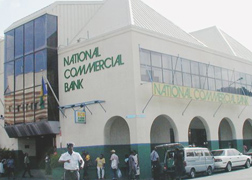
ST. VINCENT: – The Dr. Ralph Gonsalves government has maintained that privatising the National Commercial Bank (NCB) was a good decision and is encouraging Vincentians to buy shares when they are offered to the public.
“We are confident that it is the correct policy, within the framework I have outlined and for the benefits. The bank in 2010 is bigger, better and stronger than [in 2001],” Gonsalves told Parliament on Monday, Oct. 25.
“All the data show that, and we intend to make it even bigger, better, stronger, through this process of incorporation with the Eastern Caribbean Financial Holding, which is buying 51 per cent,” he added.
The Gonsalves administration and East Caribbean Financial Holding Company Limited (ECFH) of Saint Lucia reached an agreement on Sept. 29 to sell 51 per cent of the NCB to ECFH for EC$42 million (US$15.55 million).
The deal was struck even as the opposition New Democratic Party (NDP) led by Arnhim Eustace said the Gonsalves government had mismanaged the bank, bringing it to the point of collapse. (Go to the homepage to subscribe to I Witness-News)
But Gonsalves told Parliament that the NCB has registered moderate growth in its asset base, averaging seven per cent between 2003 and 2008, and peaking at 15 per cent in 2007.
The dividend retention policy adopted in 2003 resulted in the tier one capital rising above the eight percent mandated by the Eastern Caribbean Central Bank (ECCB) that same year, Gonsalves said.
The NCB had in the past explored avenues to augment its capital base by seeking strategic alliances with larger regional capital banks and/or divestment of majority ownership, said Gonsalves who is also Minister of Finance.
“The recent global economic downturn and the attendant universal upheaval in the financial industry has once again elevated the issue of capital adequacy of financial institutions to a high level of high priority and similarly its sufficiency,” he said.
He said that stress tests on some banks in the United Sates and the United Kingdom have found their capital base to be inadequate.
Gonsalves said that while the ECCB had not mandated stress tests for banks in the region, the challenges facing the financial sector and threats to indigenous banks are widely acknowledged.
He further suggested that the ECCB might require banks to increase their capital requirements from 8 to 15 per cent, based on the finding of internal stress tests conducted by indigenous banks.
“If they were to do that, we will satisfy those requirements, but there are some other banks — indigenous banks — which would not have satisfied those requirements,” he said.
Gonsalves said his government and ECFH were finalising all the legal and administrative arrangements to fully complete transfer of the shares. (Follow I Witness-News on Facebook)
He said the requisite financial approvals should be complete and in place by the end of the first week in November, by which time a transfer date will be agreed.
“In the meantime, of course, the bank continues to do business as usual,” he said.
“The benefits to the NCB of up streaming into a larger regional bank will be garnered in several areas of concern and risk, including

governance; access to a larger pool of core resources, including funding and other corporate activities, human resource management, training, risk management capabilities, finance, fund management, marketing operations systems and procedures, and policy development; the provision of the necessary safety nets in the event of external shocks; expanding the scope for the growth in the core business; diversification into other sectors of financial services; localized decision making … leveraging the strength of the respective boards to create or to be part of a strong regional brand, and advance the contingency arrangement to negate the corresponding banking risk,” Gonsalves said.
“These are the basic reasons which have been advanced by the management of the bank,” he added, noting that three experienced Vincentian bankers and the governor of the ECCB, Sir K. Dwight Venner, had endorsement the policy adopted by the bank.
He further said that there would be no staff changes, adding, “The sale price is what is reflected of the book value and I have been advised that companies, including banks, in the region trade more or less at their book values.”
Gonsalves said he hopes that when shares are offered to the public “Vincentians would be properly advised so that the ordinary man — the man in the street — will be able to have an opportunity to buy shares in the bank”.
He further noted that the EC$100 million (US$37 milliom) borrowed from the Caribbean Development Bank (CDB) to clear up government debts at the NCB before the sale would not add any additional burden to taxpayers.
“We are just replacing $100 million there [at the NCB] with $100 million from the Caribbean Development Bank, so that greater liquidity will be provided to the National Commercial Bank with this $100 million and where we will pay 4.5 per cent at the Caribbean Development Bank, rather than at the National Commercial Bank, paying 9 per cent,” Gonsalves said.
He further said that state lands valued EC$32 million (US$11.85) that were transferred from the state-owned National Properties Limited (NPL) to the NCB would be retransferred to NPL when the $100 million moves from the CBD to the NCB.
“I want to say that the Caribbean Development Bank didn’t come to us. I went to the Caribbean Development Bank for a public policy loan. This is what it is,” he said in obvious reference to those who had said that the CDB had stepped in to rescue the NCB.





